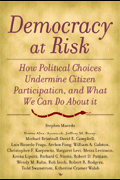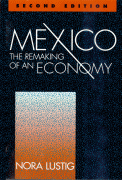Studies in this week’s Hutchins Roundup find that Oregon’s Medicaid expansion increased voter turnout, inflation in emerging economies is affected more by domestic policy than global policy, and more.
Want to receive the Hutchins Roundup as an email? Sign up here to get it in your inbox every Thursday.
Medicaid enrollment increases voter turnout – at least temporarily
In 2008, Oregon drew names at random from a waiting list of 90,000 uninsured, low-income adults for 10,000 available slots in its Medicaid program. By comparing people selected for Medicaid with those not selected, Katherine Baicker of the University of Chicago and Amy Finkelstein of MIT find that turnout in the November 2008 Presidential election of those who enrolled in Medicaid was 2.5 percentage points, or about 7 percent, higher than the 34 percent turnout amongst those not selected. The impact of Medicaid enrollment was particularly pronounced for men, for whom Medicaid enrollment increased turnout by 5.4 percentage points, and for residents of Democratic counties, for whom Medicaid enrollment increased turnout by 3.6 percentage points. The authors say that the increase in voter turnout likely reflects newly registered voters. There is no evidence of an increase in voter turnout in subsequent elections, at least through November 2010.
Inflation in emerging economies is driven more by domestic policy than global factors
Inflation in emerging markets has remained low and stable since the 2000s. Is the improvement due to domestic factors or have global factors been exerting downward pressure on inflation across the world? Studying 19 large emerging market economies from 2004-2018, Rudolfs Bems, Francesca Caselli, Francesco Grigoli, and Betrand Gruss from the International Monetary Fund find that inflation is much more strongly influenced by domestic factors than external ones. A one percentage point increase in inflation expectations raises current inflation by 0.6 percentage points, and a one percentage point increase in past inflation raises current inflation by 0.5 percentage points. Domestic cyclical factors also affect inflation albeit to a smaller degree. The impact of global factors is, however, negligible, suggesting that policymakers in those economies still have substantial influence on domestic inflation. The authors reason that better domestic policies such as inflation targeting and fiscal rules lead to price stability and policy predictability, which increases the sensitivity of inflation to domestic factors.
Increased trade competition leads to higher fertility, more marriages, and fewer divorces
Wolfgang Keller of the University of Colorado and Hâle Utar of Bielefeld University use Danish data on new births, marriages, divorces and labor markets to study the impact of rising Chinese textile imports from 1999 to 2007. They find that as trade lowers market employment opportunities effected workers, and particularly women, shift towards family activities. The removal of quotas on Chinese textile exports following the country’s entry into the World Trade Organization in late 2001 led to a 23 percent increase in fertility and a similar uptake in parental leave for unmarried women working in the textile industry. The removal of textile quotas also increased the marriage probability of unmarried women by 25 percent and substantially reduced the divorce rate among married women. Women in their childbearing years account for most of the impact because, the authors argue, they face a time constraint on their ability to bear children and therefore have a greater incentive to leave the workforce. The authors show that over a six-year period from 2002 to 2007 women lose 85 percent of one year’s salary on average from increased trade competition because they shift towards family activities; men don’t significantly lose earnings. This suggests that globalization can exacerbate the gender income gap.
Chart of the week: Labor force participation among prime-age women in the United States has been stagnant since the late 90s, but has been rising in Canada

Quote of the week:
“Providers of e-money argue that they are less risky than banks, because they do not lend money. Instead, they hold client funds in custodian accounts, and simply settle payments within their networks. For their part, cryptocurrencies seek to anchor trust in technology. So long as they are transparent—and if you are tech savvy—you might trust their services. Still, I am not entirely convinced. Proper regulation of these entities will remain a pillar of trust. Should we go further? Beyond regulation, should the state remain an active player in the market for money? Should it fill the void left by the retreat of cash?” asks Christine Lagarde, managing director at the International Monetary Fund.
“Let me be more specific: Should central banks issue a new digital form of money? A state-backed token, or perhaps an account held directly at the central bank, available to people and firms for retail payments? True, your deposits in commercial banks are already digital. But a digital currency would be a liability of the state, like cash today, not of a private firm. This is not science fiction. Various central banks around the world are seriously considering these ideas, including Canada, China, Sweden, and Uruguay. They are embracing change and new thinking—as indeed is the IMF…I believe we should consider the possibility to issue digital currency. There may be a role for the state to supply money to the digital economy. This currency could satisfy public policy goals, such as (1) financial inclusion, and (2) security and consumer protection; and to provide what the private sector cannot: (3) privacy in payments.”
The Brookings Institution is committed to quality, independence, and impact.
We are supported by a diverse array of funders. In line with our values and policies, each Brookings publication represents the sole views of its author(s).










Commentary
Hutchins Roundup: Medicaid increases voter turnout, inflation in emerging markets, and more
November 15, 2018